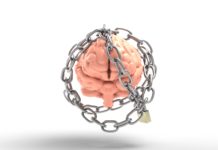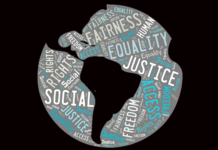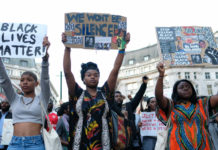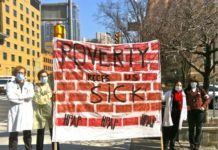To Live and (Almost) Die in L.A.: A Survivor’s Tale
After 25 years of chronic emergency, 22 mental hospitalizations, a stint at a “community mental health center,” 13 years in a "board & care," repeated withdrawals from addictions to legal drugs, and a 12-year marriage, I plan to live every last breath out as a survivor, an advocate, and an artist.
Experts Raise Ethical Concerns About Machine Learning in Medicine
The use of machine learning algorithms (known as artificial intelligence) in the medical field raises a slew of ethical concerns.
Psychotropic Medications Serve as Powerful Tools for U.S. Military, Imperialism
Ethnographic research sheds light on extensive psychopharmaceutical use by soldiers in post 9/11 U.S. wars.
Mobile Apps for Mental Health Lack Transparency in Data Sharing
Research illustrates privacy concerns with how mental health applications collect and share users’ data.
Psychology Must Become a Sanctuary Discipline to Heal Racial Trauma
Researchers explore pathways of healing racial trauma in Latinx immigrant communities.
United Nations Rep Brings Attention to Human Rights Violations in Psychiatry
Dr. Dainius Pūras argues that the status quo in mental health treatment is no longer acceptable and demands political action to promote human rights.
Psychologists Advise How to Help and Minimize Harm Working With Migrants and Refugees
While well intentioned, providers and volunteers can do more harm than good at the border. The Global Psychosocial Network issues guidelines on how to work for the benefit of migrants and refugees.
Does Psychotherapy Reproduce or Disrupt Neoliberal Capitalism?
Researchers explore neoliberal influences on interactions in psychotherapy and question whether the radical potential of psychotherapy can counter prevailing social systems.
Linking Screen Time, Smartphones, and Stress Among Young Adults
New review ties increased screen time to increasing anxiety and depression among young adults throughout the United States.
Sociologists Interrogate Neurobiological Explanations in Criminology
A discourse analysis conducted by sociologists finds problematic assumptions and practices in the field of neurocriminology.
The Conflicts That Result From Globalizing Euro-American Psychology in India
Researchers examine the transformation of work, life, and identity in India as a result of Western corporate and psychological culture.
What Does Social Justice Really Mean for Psychologists?
Without clarity and consensus around what social justice means, psychologists risk perpetuating injustices that undermine their stated mission.
Challenging Resilience as a Buzzword: Toward a Contextualized Resilience Model
Researcher Dr. Silke Schwarz highlights how Western psychology’s construction of individual resilience deflects emphasized individual pathology and deflects efforts at structural change.
Sociologist Questions Effectiveness and Ethics of Mental Health Services
Medical sociologist David Pilgrim argues that mental health care is neither effective nor “kindly,” as it often relies on flawed research and ineffective treatments.
Screening Instruments Do Not Reflect Individual Experiences of Depression
Researchers detect discrepancies between the language used to describe lived experiences of mental health and the language used in modern screening tools.
Mental Health Apps May Lead to Overdiagnosis, Study Finds
A new study finds that mental health apps promote a one-dimensional view of mental health.
Police Killings Vicariously Impact Mental Health of Black Americans
New research provides evidence that police killings of unarmed Black Americans impact the mental health of Black Americans.
FDA Defends Decision to Approve Digital Aripiprazole
Members of the U.S. Food and Drug Administration’s Psychiatry Products division go on the defensive in a new article, responding to concerns about the agency’s approval of digital aripiprazole.
Differing Depression Diagnostic Tools May Influence Research Findings
The type of diagnostic assessment used in research settings, either fully structured or semi-structured interview, may affect which participants in receive a diagnosis of major depression.
Do Social Network Sites Help or Harm Well Being?
How does social network site use influence well-being? Researchers suggest this depends on the extent to which site use is “connection-promoting."
How Victimization Affects Political Engagement in Adolescence
Study examines relationships between experiences of victimization, beliefs in government, and political participation among 12th grade students
When Facebook Sent the Cops to My Shelter
Somehow, something I had said in this “secret” Facebook group had been made known. And now, at almost midnight, a cop was banging at the door of the lady who had been keeping me safe in a secret place. How did a “secret” Facebook conversation bring the cops to an address I didn’t have to perform a suicide prevention “welfare check”? Here’s what their “safe” meant to my safety.
Study Explores Meanings of Bipolar Disorder to Those Diagnosed
The narratives about Bipolar Disorder promoted by drug companies may influence how those diagnosed understand themselves.
Estimates of Depression Prevalence are Exaggerated, Study Finds
New research demonstrates that common methods for estimating depression prevalence lead to overestimation and exaggerated statistics.
Underestimating Social Determinants of Health Linked to Right-Wing Authoritarianism
Social determinants have been seen to have an equal, if not greater, influence on health as individual behaviors, yet this evidence is largely ignored. Researchers investigate why this is the case.
































